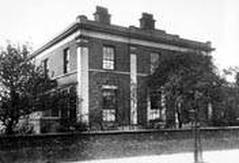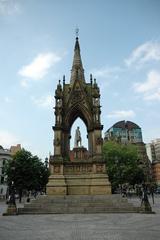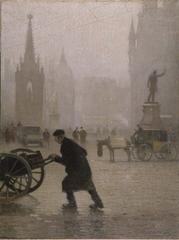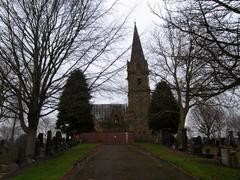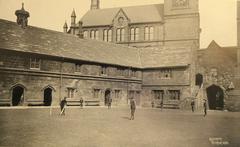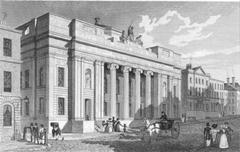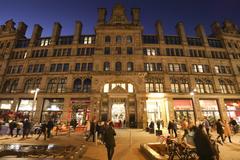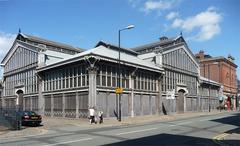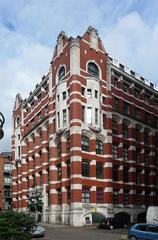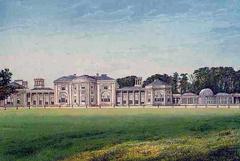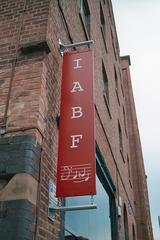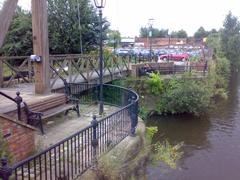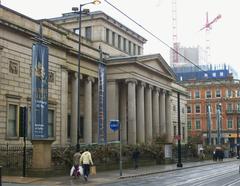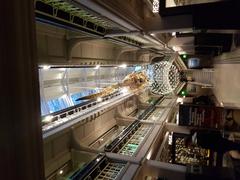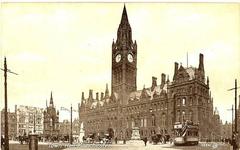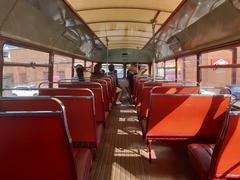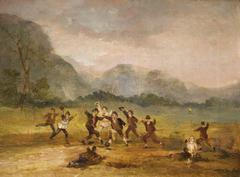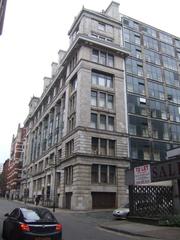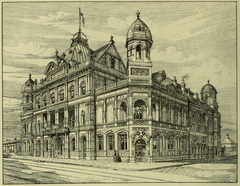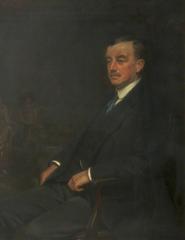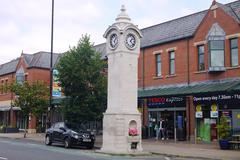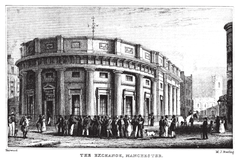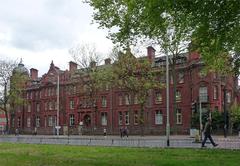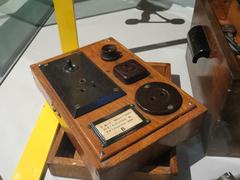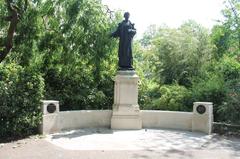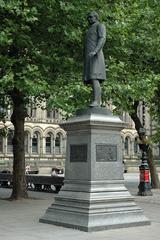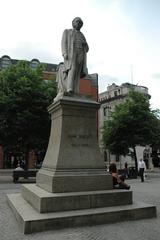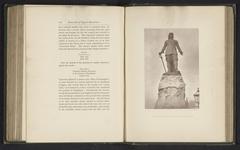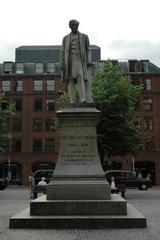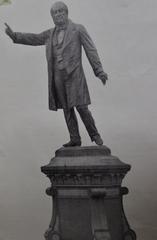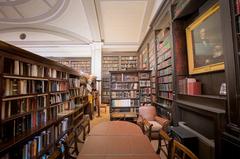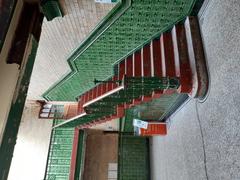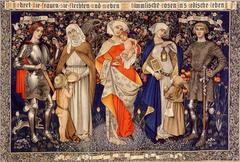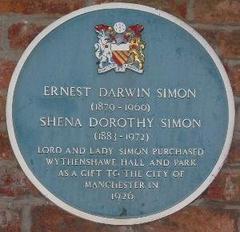Clayton Hall Living History Museum Manchester: Visiting Hours, Tickets, and Travel Guide
Date: 14/06/2025
Introduction
Nestled in Manchester’s historic Clayton district, Clayton Hall Living History Museum is a rare and atmospheric medieval moated manor house. As a Grade II* listed building and scheduled ancient monument with origins in the 12th century, the Hall offers visitors a fascinating journey through the layers of Manchester’s social, cultural, and architectural history. Managed by dedicated volunteers, the museum combines hands-on, interactive exhibits, costumed interpretation, and educational programming to create an immersive experience for all ages.
This guide provides comprehensive information on Clayton Hall’s significance, its architectural and historical evolution, practical details for planning your visit—including opening hours and tickets—accessibility guidance, and tips for making the most of your time at one of Manchester’s hidden gems. Whether you are a heritage enthusiast, family group, or educator, Clayton Hall offers a window into England’s past within a vibrant community setting.
For the latest updates and detailed visitor information, refer directly to the official Clayton Hall website, as well as these additional resources: Wikipedia, BB Heritage Studio.
Table of Contents
- Historical Background
- Visitor Information
- Frequently Asked Questions
- Visitor Tips
- Conclusion
- References
Historical Background
Medieval Origins and Moated Site
Clayton Hall stands as one of Manchester’s last surviving medieval moated manor houses, with its earliest references dating back to the 12th century. Constructed for the Clayton family, the site’s prominent defensive moat and mound—measuring around 66 by 74 metres—reflect the turbulent times and the status of its original owners. The moat, crossed by a 17th-century stone bridge, remains a distinctive and rare feature in Greater Manchester (Wikipedia; BB Heritage Studio).
Architectural Evolution and Conservation
The present hall structure primarily dates from the 15th century, rebuilt over earlier timber-framed buildings. Over the centuries, the Hall evolved architecturally, blending Tudor and Georgian elements. The red brick and timber-framed western wing is the main survivor, with notable features including stone slate roofs, a spiral staircase, and several “witch marks”—apotropaic carvings intended to ward off evil. Restoration and conservation projects in the 20th and 21st centuries have preserved the Hall’s historic fabric, with upgrades to infrastructure, careful repairs, and ongoing maintenance carried out under the oversight of heritage professionals (BB Heritage Studio; Clayton Hall Official Site).
Notable Owners: Byron and Chetham Families
Following the marriage of Cecilia Clayton to Robert de Byron in 1194, the Byron family—ancestors of the poet Lord Byron—controlled the estate for over four centuries. Their stewardship established the Hall as a seat of local power and influence (Wikipedia).
In the early 17th century, the Hall passed to the Chetham family, with Humphrey Chetham (1580–1653) becoming its most distinguished resident. Chetham, a philanthropist and founder of Chetham’s Library (the oldest free public library in the English-speaking world), died at the Hall in 1653. The Chetham family’s legacy is commemorated in the museum’s exhibits and educational programs (Wikipedia; Manchester Evening News).
Modern Restoration and Museum Transformation
By the 18th and 19th centuries, much of the Hall’s original complex was demolished, and its role changed as Manchester industrialized. After periods of decline, the Hall underwent restoration in 1900 and was eventually acquired by Manchester Corporation, with stipulations to preserve its historical significance.
Since 2014, the Friends of Clayton Park and dedicated volunteers have managed the Hall as a living history museum and community hub, blending heritage interpretation with hands-on activities, costumed guides, and special events (Clayton Hall Official Site; Manchester Histories).
Cultural and Community Importance
Clayton Hall is recognized as a center for community engagement, heritage education, and cultural events. Its immersive living history approach—complete with Victorian and Tudor room settings, local history collections, and interactive workshops—makes it a vital part of Manchester’s heritage landscape and a favorite destination for school and family visits (Clayton Hall Official Site; Secret Manchester).
Visitor Information
Visiting Hours and Tickets
-
General Admission:
Clayton Hall is open to the public on the first and third Saturdays of each month from February to November. Visiting hours are 11:00 am to 4:00 pm, with last entry at 3:00 pm (Clayton Hall What’s On).
Some sources also note opening on Wednesdays and Saturdays; always check the official website for current times. -
Tickets and Admission:
Admission is free. Donations are welcomed to support the museum’s charitable and educational work. Special events—including concerts and workshops—may require advance booking and a small fee (Clayton Hall Events).
Location, Directions, and Parking
-
Address:
Clayton Hall, Ashton New Road, Manchester, M11 4RU.
Situated within Clayton Park and close to the Etihad Stadium. -
Public Transport:
Clayton Hall is easily accessible via the Clayton Hall Metrolink stop (a 5-minute walk), and by several local bus routes (Transport for Greater Manchester). -
Parking:
Free on-street parking permits are available during opening hours; request a permit and provide your registration number upon arrival (Clayton Hall What’s On).
Accessibility
- The ground floor, including the tea room and accessible toilets, is wheelchair accessible via ramps (Clayton Hall Accessibility).
- Due to the Hall’s historic structure, some upper floors and rooms are only accessible by stairs.
- Assistance dogs are welcome; large-print guides and sensory-friendly resources are available on request.
- Contact the museum in advance to discuss specific accessibility needs.
Facilities and Amenities
- Tea Room:
Serves hot drinks, cakes, and light snacks made by volunteers. Indoor and outdoor seating available (Clayton Hall What’s On). - Gift Shop:
Offers souvenirs, local history books, and handmade crafts. - Toilets and Baby Changing:
Facilities available on the ground floor. - Rest Areas:
Garden seating and picnic spots in the surrounding parkland.
Special Events, Tours, and Family Activities
- Hands-On History:
Interactive exhibits include dressing in period costume, handling replica artifacts, and exploring themed rooms (Victorian kitchen, Memories Room, Textiles Room with historical sewing machines). - Guided & Self-Guided Tours:
Knowledgeable, often costumed volunteers provide engaging tours on open days (Clayton Hall Tours). - Workshops & Seasonal Events:
Regular activities include craft sessions, music performances, Victorian Christmas, and historical reenactments. Some require advance ticketing (Clayton Hall Events). - School and Group Visits:
Curriculum-linked workshops and bespoke tours are available for educational groups (Clayton Hall Schools). Advance booking for groups is recommended.
Nearby Attractions
- Philips Park: Manchester’s oldest public park with landscaped gardens and riverside walks (Philips Park Manchester).
- Etihad Stadium: Home of Manchester City FC—combine your visit with a stadium tour (Manchester City Stadium Tours).
- Chetham’s Library, Manchester Museum, Whitworth Art Gallery: All accessible via public transport for a broader heritage and culture itinerary.
Frequently Asked Questions (FAQ)
What are Clayton Hall’s visiting hours?
First and third Saturdays (Feb–Nov), 11:00 am–4:00 pm; some sources note additional days—check the official website for updates.
Is admission free?
Yes, general admission is free. Special events may require tickets.
Is the museum wheelchair accessible?
The ground floor and tea room are accessible; upper floors require stairs. Contact ahead for details.
Are guided tours available?
Yes, volunteer-led tours are usually available on open days.
Can I bring my dog?
Only assistance dogs are permitted inside the museum.
Are there parking facilities?
Free on-street parking permits are provided during opening hours.
Is photography allowed?
Personal photography is welcome; commercial photography requires permission (Clayton Hall Filming).
Visitor Tips
- Plan ahead: Check opening dates and special event listings on the official website.
- Arrive early: Special events can be popular and the Hall has limited capacity.
- Dress comfortably: Wear flat shoes and bring a jacket for uneven floors or garden walks.
- Support the museum: Donations and purchases in the tea room or gift shop directly sustain the site.
- Engage with volunteers: Their stories and knowledge greatly enrich the experience.
- Combine your visit: Nearby parks, stadiums, and museums make for a full day out.
Conclusion
Clayton Hall Living History Museum is more than a preserved manor house—it’s a vibrant, community-driven heritage site that brings Manchester’s layered history to life. From its medieval moat and Tudor origins to its Victorian interiors and modern educational mission, the Hall offers an engaging, hands-on experience for visitors of all ages. With free admission, welcoming volunteers, and a host of interactive events, Clayton Hall is an essential stop for anyone exploring Manchester’s past.
Before your visit, consult the official Clayton Hall website for the latest information on opening times, events, and accessibility. Enhance your experience with the Audiala app, which offers audio guides and interactive features for Manchester’s cultural landmarks.
By visiting, donating, or volunteering, you help ensure this unique monument continues to educate and inspire future generations.
References
- Clayton Hall Official Site. About Clayton Hall. (https://claytonhall.org/about/)
- Clayton Hall Official Site. Visit and Events. (https://claytonhall.org/visit/)
- Wikipedia contributors. Clayton Hall. (https://en.wikipedia.org/wiki/Clayton_Hall)
- BB Heritage Studio. Clayton Hall Conservation Project. (https://bbheritagestudio.com/projects/clayton-hall/)
- Manchester Histories. Heritage Organisations Across Greater Manchester. (https://manchesterhistories.co.uk/learn/heritage-organisations-across-greater-manchester-museums-and-venues/)
- Manchester Evening News. How Inside Hundreds of Greater Manchester’s Historic Sites. (https://www.manchestereveningnews.co.uk/whats-on/whats-on-news/how-inside-hundreds-greater-manchesters-29819354)
- Secret Manchester. Museums for Kids in Manchester. (https://secretmanchester.com/museums-kids-manchester/)
- Philips Park Manchester. (https://www.manchester.gov.uk/directory_record/117288/philips_park)
- Manchester City Stadium Tours. (https://www.mancity.com/etihad-stadium/tours)
- Transport for Greater Manchester. (https://tfgm.com/public-transport)
